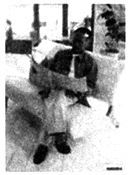题目内容
You will have a lot of reading to do in this grade this year. You can do more of it in less time if you learn to read rapidly.

Perhaps you have been told about some habits
(习惯)which keep a person from reading fast and have been strongly asked to break those habits which you might have.Do you still have any of these bad habits? Check yourself by answering
“yes”or“no”to these questions.(1) Do you move your lips
(嘴唇)when reading silently?(2) Do you point to words with your finger as you read?
(3) Do you move your head from side to side as you read?
(4) Do you read one word at a time?
If you answer
“yes”to any of these questions, start at once to break the habit. If you move your lips, hold your fingers over them, or hold a piece of paper between your lips while you are reading. Then if your lips move, your will know it and can stop them.If you point to words, hold the two sides of your book, one side with your left hand, the other side with your right hand. Then you won't have a free finger to use in pointing while reading. If you move your head, place your chin
(下巴)in one hand and hold your head still(静止不动的).If you read no more than one or two or three words at a time, you need to work very hard in learning to take in
(吸收)more words at each glance(一瞥)as your eyes travel across the lines of words.Even if you do rather fast now, you can learn to read even faster. As you probably have been told, the secret of fast reading is to take in whole groups of words as each glance. Read in through groups and force
(迫使)your eyes along the lines of words as fast as you can to make them go. Anyone who practices doing these things will be able to read faster.(1)You may hold your fingers over your lips while reading so as __________.
[ ]
A
.to tell others to be silentB
.to feel whether your lips move or notC
.to hold a piece of paper between themD
.to keep yourself from talking to others(2)When you read, __________.
[ ]
A
.don't keep your head stillB
.don't hold your books with your handsC
.don't stand up near a deskD
.don't use your finger to point to words(3)If you learn to read fast, __________.
[ ]
A
.you can read more in less timeB
.you can write fasterC
.you can understand betterD
.you can read less in more time(4)You must __________ those habits that we are talking about in this reading.
[ ]
|
A .remember |
B .have |
|
C .get rid of |
D .keep |
(5)This reading is mainly about __________.
[ ]
A
.the way of reading fastB
.the importance of fast readingC
.the bad habits in readingD
.how to speak quickly解析:
|
(1) 作者说“把手指放到唇边”,目的是感觉嘴唇是否在动。因而答案为B。(2) 根据本文中的介绍,不难选出正确的答案D正是阅读中的坏习惯。(3) 读的速度快了,自然可以在较少的时间内阅读到更多的东西。(4) 通读全文,显然作者并不是要我们记住这些阅读中的坏习惯,而是告诉我们如何去克服它们。(5) 本文详细阐述了阅读中常见的四个坏习惯,并介绍了克服的方法。根据这一主旨,正确的答案为C。 |

完形填空
Plants are very important 1 things. Life could not go 2 if there were no plants. This is because plants can make food from air, water and sunlight. But animals and man cannot 3 so. Animals get their food by eating plants and 4 animals. Man gets its food by eating plants and animals too. 5 animals and man 6 plants in order to 7 . This is why we find that there are so many plants around us.
If you look 8 at the plants around you, you will find that there are many types of plants. Some plants are large, 9 others are small. 10 plants are green. There are two sorts(种类)of plants: flowering plants and non-flowering(不开花的)plants.
Flowering plants have roots(根),stems(茎),leaves, flowers and fruits(果子). 11 all the trees around us are flowering plants. Flowering plants 12 make seeds(种子). The sends 13 by the fruits. Some fruits have one seed, some have two, three or four, and some have many seeds. But a few fruits have no seeds 14 . 15 example of a fruit 16 seeds is banana fruit.
Most non-flowering plants do not grow from seeds. They grow from spores(孢子). Spores are small. Some spores are 17 small and 18 that they can float(漂浮) 19 the air. We may say that spores are quite different from seeds. When these spores 20 on wet and shady(阴凉的)places, they usually grow into plants.
1. A.live |
B.lively |
C.living |
D.lived |
[ ] |
2. A.through |
B.over |
C.down |
D.on |
[ ] |
3. A.hope |
B.do |
C.think |
D.make |
[ ] |
4. A.another |
B.the other |
C.other |
D.others |
[ ] |
5. A.Though |
B.And |
C.But |
D.So |
[ ] |
6. A.need |
B.want |
C.find |
D.have |
[ ] |
7. A.grow |
B.live |
C.work |
D.eat |
[ ] |
8. A.careful |
B.clear |
C.carefully |
D.clearly |
[ ] |
9. A.while |
B.when |
C.since |
D.as |
[ ] |
10. A.A great deal of |
B.Lot of |
C.More |
D.Most |
[ ] |
11. A.Between |
B.Except |
C.Almost |
D.Hardly |
[ ] |
12. A.should |
B.can |
C.may |
D.must |
[ ] |
13. A.are born |
B.are hidden |
C.are stored |
D.are kept |
[ ] |
14. A.any longer |
B.any more |
C.at last |
D.at all |
[ ] |
15. A.The |
B.An |
C.A |
D.For |
[ ] |
16. A.without |
B.with |
C.full of |
D.of |
[ ] |
17. A.too |
B.very |
C.so |
D.much |
[ ] |
18. A light |
B.active |
C.little |
D.strong |
[ ] |
19. A.on |
B.in |
C.by |
D.above |
[ ] |
20. A.put |
B.move |
C.place |
D.fall |
[ ] |